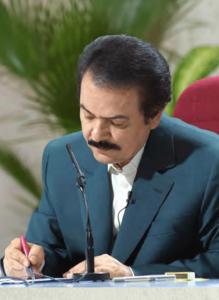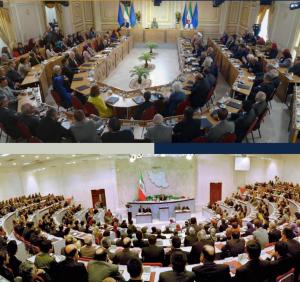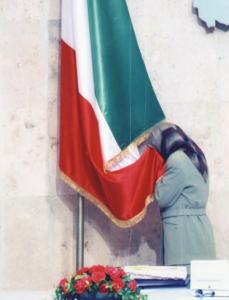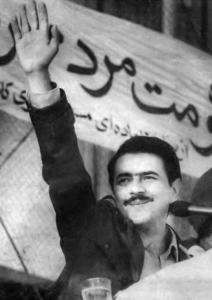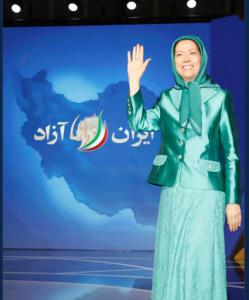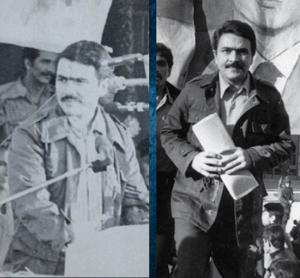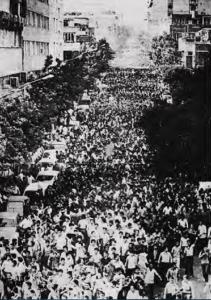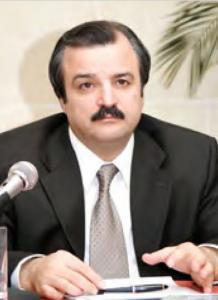
Mr. Mohammed Mohaddessin is the Chairperson of the Foreign Affairs Committee of the National Council of Resistance of Iran (NCRI).
In November 2002, the NCRI adopted a Plan to form a National Solidarity Front to overthrow the religious dictatorship ruling Iran.
The National Council of Resistance of Iran (NCRI) is a democratic coalition of Iranian opposition organizations. It has emerged as the democratic alternative to the religious dictatorship ruling Iran.”
PARIS, FRANCE, June 27, 2021 /EINPresswire.com/ -- The National Council of Resistance of Iran (NCRI) represents an enduring democratic political coalition, founded in Tehran in July 1981, which has steadfastly sought an end to religious dictatorship and promotes a free and democratic Iran based on its platform. The NCRI has adopted numerous plans for future Iran, one of which is the Plan to form a National Solidarity Front to overthrow the religious dictatorship ruling Iran. — NCRI
The plan calls for all forces who reject the ruling theocracy with all its factions, and who endorse the separation of religion and state and believe in a republic to join the front. Mrs. Rajavi, described the Front as ?a reflection of the most profound democratic yearnings of all the people of Iran, regardless of ideology, belief, religion and ethnicity that transcends all partisan and political interests.? She said the Front ?embodies the unshakable resolve of the Iranian people to overthrow the mullahs? inhuman regime.?
Get to Know the National Council of Resistance of Iran (NCRI)
Parliament of Iranian Resistance
The NCRI serves as the Parliament of the Iranian Resistance.
NCRI members include political figures representing a broad spectrum of political tendencies in Iran, and representatives of ethnic and religious minorities. The NCRI aims to establish a pluralistic republic in Iran, based on separation of religion and state. Women comprise the majority of the Council?s members in line with the movement?s emphasis on recognizing the equal participation of women in the political, social, and economic leadership of Iranian society.
The NCRI has formed 25 committees to deal with the issues of preparing for a future provisional coalition government once the illegitimate regime of the mullahs is toppled. Chairing each committee is a prominent political personality who is an expert in the field.
All members of the Council have one vote. All decisions are adopted by a simple majority. Once the clerical regime is toppled, the NCRI will act as a provisional government and will be in power for only six months. Its main responsibility is to organize a free and fair election for a National Legislative and Constituent Assembly that will determine the future form of government in Iran and transfer power to the representatives of the people of Iran.
Plans Adopted by NCRI
? Peace Plan for the Iran-Iraq War ? March 13, 1983
? Plan for Autonomy of Iranian Kurdistan ?November 8, 1983
? Plan for Freedoms and Rights of Women ?April 17, 1985
? Plan on Provisional Government?s Relations with Religion in Iran ? November 1985
? Plan of National Solidarity Front to Overthrow Religious Dictatorship Ruling Iran ? November 4, 2002
Vote for NCRI President-elect
October 22, 1993, that in a landmark plenary session, the NCRI voted unanimously to elect Mrs. Maryam Rajavi as the President-elect for the transitional period after the downfall of the religious dictatorship regime. Her mandate is to oversee the peaceful transfer of power to the Iranian people following the regime?s overthrow.
National Solidarity Front
In November 2002, the NCRI adopted a Plan to form a National Solidarity Front to overthrow the religious dictatorship ruling Iran. The plan calls for all forces who reject the ruling theocracy with all its factions, and who endorse the separation of religion and state and believe in a republic to join the front.
Mrs. Rajavi, described the Front as ?a reflection of the most profound democratic yearnings of all the people of Iran, regardless of ideology, belief, religion and ethnicity that transcends all partisan and political interests.? She said the Front ?embodies the unshakable resolve of the Iranian people to overthrow the mullahs? inhuman regime.?
President-Elect for the transitional period
Mrs. Maryam Rajavi is the President-elect of the NCRI. In this capacity, she has mounted an extraordinary political, social, cultural, and ideological challenge to the ruling mullahs in Iran. Under her leadership, women have risen to hold leading positions in the Iranian Resistance. Over half of NCRI members are women.
Mrs. Rajavi has made numerous speeches challenging the mullahs? fundamentalist interpretation of Islam and has promoted tolerance and democracy. By her exceptional courage and determination, she has led by example to the many Iranians who seek democratic rule in Iran.
NCRI Secretariat
The NCRI has a secretariat based in Paris, headed by Ms. Mahnaz Salimian as the Senior Secretary of the NCRI. Mr. Abolghasem Rezaee is the Deputy Senior Secretary of NCRI. In total, the NCRI has five secretaries. The secretariat convenes NCRI meetings, conducts communications with members, and performs all administrative tasks.
NCRI Membership
The NCRI has nearly five hundred individual members, who are among the most prominent and respected Iranian academics, public servants, industrialists, entrepreneurs, former political prisoners, sports champions, writers, cultural figures, and human rights activists.
Chairperson of the NCRI Foreign Affairs Committee
Mr. Mohammed Mohaddessin is the Chairperson of the
Foreign Affairs Committee of the National Council of Resistance of Iran (NCRI). The son of a Grand Ayatollah and native of Qom, Mr. Mohaddessin, spent four years in the Shah?s prisons during the 1970s as a prisoner of conscience due to his political activities in opposition to the Shah?s regime. After the release of political prisoners in 1979, Mr. Mohaddessin joined the PMOI/MEK campaign against Khomeini?s authoritarian and reactionary tilt to absolute religious rule. Mr. Mohaddessin has served in key positions in the PMOI/MEK and the NCRI.
Maryam Rajavi?s Ten-point Plan for Future
The ten-point plan encompasses Maryam Rajavi?s vision for the future of Iran. The plan, which was first announced when she addressed a parliamentary group at the Council of Europe, has met widespread support from Iranians and the international community.
A synopsis of the NCRI Platform:
Human Rights:
The NCRI pledges to uphold the Universal Declaration of Human Rights and all international covenants on human rights, including ?freedom of association, freedom of thought and expression, media, political parties, trade unions, councils, religions and denominations, freedom of profession, and prevention of any violation of individual and social rights and freedoms.?
Women:
The NCRI recognizes ?the right of women to vote and stand as candidates in all elections, and the right to vote in all referenda,? ?the right to employment and free selection of profession, and the right to hold any public office, including the presidency or judgeship,? ?the right to freely choose to clothe,? and ?the right to use, without discrimination, all instructional, educational, athletic, and artistic resources; the right to participate in all athletic competitions and artistic activities.?
Economy:
The NCRI accepts national capitalism and the market economy, private ownership, and investment. It emphasizes the need to utilize the latest scientific and technological achievements and views relations with the industrialized world as necessary to reconstruct Iran?s economy.
Freedom of Religion:
The NCRI believes in the separation of religion and state. According to its ratifications, ?all forms of discrimination against the followers of various religions and denominations in the enjoyment of their individual and social rights are prohibited. No citizen shall enjoy any privileges or be subject to any deprivations with respect to the nomination for election, suffrage, employment, education, becoming a judge, or any other individual or social rights, for the reason of belief or non-belief in a particular religion or denomination.?
Ethnic Minorities:
The NCRI recognizes the rights of all ethnic and national minorities. It has adopted a plan for the autonomy of Iranian Kurdistan, specifying that ?the administration of all affairs of the autonomous region of Kurdistan,? except for those related to foreign policy, national defense, national security, foreign trade, and customs, ?fall within the authority of the autonomous institutions.?
International Relations:
The Council?s foreign policy is based on independence, respect for the United Nations Charter and international conventions and treaties, good neighborliness, international and regional cooperation, and non-interference in the internal affairs of other countries. The NCRI supports peace in the Middle East and is committed to maintaining and protecting peace and tranquility in the region and condemns any aggression and expansionism.
The Value of the Resistance
The value of the Iranian Resistance as a political movement is rooted in its commitment to fundamental rights, equality, pluralism, and democratic governance ? in its own institutions and procedures and in Iranian political life. As Massoud Rajavi wrote in 1982, the MEK profoundly believe that to avoid the deviations that beset contemporary movements throughout the world:
Masoud Rajavi
??they must remain wholeheartedly committed to the will of the people and democracy. If they are to act as a leading organization, before all else the society must give them a mandate in a free and fair election. It is not enough to have gone through the trials of repression, imprisonment, torture, and executions under the shah and the mullahs. The MEK must also pass the test of general elections?. If the people don?t vote for us (after we have overthrown the mullahs? regime), we shall remain in opposition, holding firmly to our principles.?
It is for this very reason that Rajavi and other officials of the PMOI/MEK and NCRI have made the same public promise throughout their history. They have maintained that if Khomeini or Khamenei ever conceded to a free and open election under full UN supervision within the framework of the people?s sovereignty and not velayat-e faqih, the Resistance would return peacefully to Iran to participate in the elections and abide by the will of the people, whatever the outcome.
The Resistance?s goal, and therefore its principal value, is to restore power to Iran?s citizens, not to seize power for itself. For as Massoud Rajavi has repeatedly argued, of its many terrible and horrific deeds, the worst of the theocratic regime?s crimes was to usurp the sovereignty from the Iranian people.
Massoud Rajavi and the People were among the very first to stand against the regime?s dictatorial bent in the name of religion, in addition to being among the first to suffer the repression, violence, and brutality of its wrath. The Resistance?s long history of opposition has made it extraordinarily familiar with the ruthlessness of the mullahs? tactics and the relentlessness of their enmity as well as uniquely adept at countering the regime and using its ideological, political, and military weaknesses against it.
Given the mullahs? drive to spread their brand of extremism to nations around the globe, the Iranian Resistance has accordingly established itself as a major check to its expansion in the Middle East and beyond.
By informing the international community about the authoritarian character and brutal excesses of the regime, monitoring and documenting its shocking record of human rights abuses, misogyny, and myriad forms of discrimination, and warning foreign nations and international agencies about Tehran?s terrorist activities and secret nuclear weapons program, the Resistance has constantly sought to raise global awareness about the threats that the Iranian regime represents to the wider world and to generate the international cooperation necessary to thwart them.
This is precisely why the Iranian regime considers the Iranian Resistance as its most lethal and feared enemy and spends immeasurable amounts of money, influence, effort, and time to demonize and destroy it through every possible means, including political suppression, imprisonment, torture, and execution in Iran, and terrorism, misinformation, and assassination campaigns abroad.
The world is a safer place for the Iranian Resistance because of its indispensable role in stopping the global spread of the Iranian regime?s extremist ideology and terrorism and thwarting its nuclear weapons program.
Indeed, were it not for the Iranian Resistance?s stunning revelation of Natanz uranium enrichment site and Arak Heavy Water facility in August 2002, and subsequent revelations that unveiled the extent to which the regime?s clandestine nuclear weapons work had advanced, and triggered inspections by the International Atomic Energy Agency (IAEA) and ensuing measures by the United Nations Security Council, the mullahs would have had the bomb by now and the fate of the Middle East and the world would not be the same.
The significance of the Iranian Resistance as a political movement consequently resides in its decades of principled responses to these urgent domestic and international problems. Through it all, the Resistance has remained a beacon of hope and inspiration for the Iranian people and an enduring bulwark against the rising tides of Islamic extremism and terrorism in the Middle East and around the globe.
NCRI?s Achievements
Starting the Resistance against Khomeini?s Tyranny
The Shah?s dictatorial rule and the unjust imprisonment of democratic-minded leaders such as Massoud Rajavi created a political vacuum that led Khomeini and his incompetent yet ruthless band of upstart mullahs to fill the void. Khomeini at first feigned interest in a broad-based government and political process. Yet as history proved, his disdain for freedom and democracy, his craving for power, and his obtuse social and political positions, quickly removed any doubt about his intentions. Street thuggery by clerical-led bands of hooligans obscured any hopes for freedom of expression or free political life.
From 1979 to 1981, Iran descended into the dark ages of religious fascism as Khomeini manipulated elections and drew up a constitution that would cement the absolute rule of clerical stewardship over the revolution. The one political party that could stand up to Khomeini was the Muslim PMOI/MEK.
Massoud Rajavi challenged Khomeini?s claim to the mantle of religious and political authority. The PMOI/MEK systematically dismantled his claims to Islam as patently false and proved his loose grasp on their interpretation of ?democratic Islam.? Khomeini could not tolerate any challenge to his supremacy and with the PMOI/MEK campaigning for an alternative vision for Iran, and with huge rallies attended by increasingly more Iranians to hear Massoud Rajavi?s fiery speeches criticizing Khomeini and his new order, he decreed their blood be spilled in a religious fatwa.
The PMOI/MEK conducted a popular mobilization of the Iranian people in this period and showed courageous discipline and non-violence in the face of violent gangs of clerical-led hooligans that attacked, injured, killed, and defaced lives and property with total impunity. By June 1981, the regime?s thugs killed dozens of PMOI/MEK supporters and imprisoned 3,000 for their peaceful political activities, many of whom would later be executed brutally without any semblance of a fair trial.
Turning Point ? 20 June 1981
The PMOI/MEK tested the last ounce of freedom on June 20, 1981, by calling on all Iranians to participate in a peaceful protest against the return to dictatorship. Khomeini was hell-bent on destroying his one capable opponent and ordered the IRGC to fire on the PMOI/MEK?s peaceful demonstration attended by half a million people in Tehran that included thousands of teenage students. The resulting carnage led to the deaths and summary executions of scores of innocent people on the sidewalks of Tehran on that day and the days to follow.
The watershed events of June 20 went down in infamy and parted the political divide in Iran between Khomeini and his gang of murderers, and the Iranian people and resistance movement. June 20 became a turning point that cemented the fate of the ruling religious dictatorship to end as all dictatorships end and birthed the Iranian Resistance movement with the PMOI/MEK as its pivotal force.
Shahin Gobadi
NCRI
+33 6 50 11 98 48
email us here
Visit us on social media:
Facebook
Twitter


